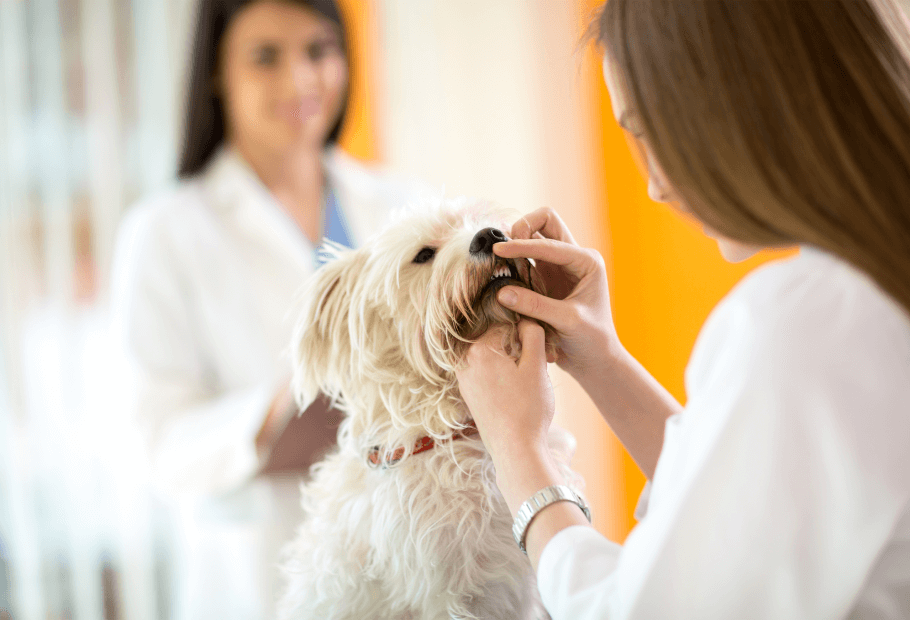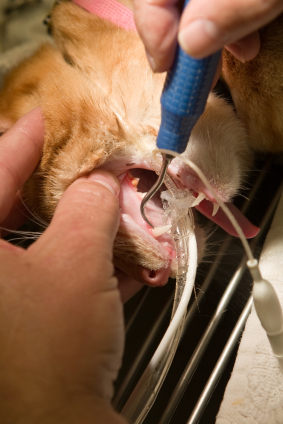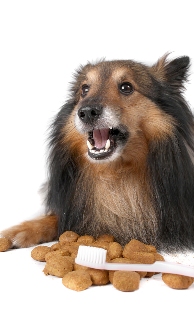
Dental Care
At Plattsburgh Animal Hospital, we cannot stress the importance of your pet having healthy teeth. Dental hygiene is one of the most overlooked aspects of veterinary care. Ignoring the dental hygiene of your pet can often be the cause of serious – yet entirely preventable – illness.

It’s estimated that more than 80 percent of dogs and 70 percent of cats develop signs of tooth and gum disease by the age of three. The most common dental condition affecting dogs and cats is periodontal disease. Periodontal disease is an infection and inflammation of the gums and supporting tissues of the teeth. The disease is caused by bacteria present in plaque and calculus (tartar).
Periodontal disease begins when plaque and calculus build upon a pet’s teeth, especially below the gumline. Bad breath is often the first noticeable symptom of the disease. Bleeding, inflammation and receding gums, pain and difficulty chewing, loosening, and the eventual loss of teeth are characteristic symptoms of the disease.
Periodontal disease is classified under two categories: gingivitis and periodontitis. Gingivitis is the more mild form of periodontal disease and is an inflammation of the gum tissue resulting in redness, swelling, and discomfort. With effective and timely teeth cleaning, gingivitis can be completely reversed. Untreated gingivitis can lead to periodontitis or severe inflammation around the tooth root, which in turn can lead to tooth loss.
Periodontitis is a condition that may be controlled but not totally cured. It is most often seen in pets that are more than five years old. Most animals with periodontitis have bad breath, tooth mobility, and bleeding gums. Severe inflammation of the gums, gum recession, alveolar bone loss (the bone that supports the tooth is “eaten away”), and pustular discharge are common signs of periodontitis. Dental problems, if left untreated, can often lead to larger systemic problems in your pet. Oral bacteria, associated with periodontitis, can be released into the bloodstream causing life-threatening damage to the kidneys, heart, and liver. At Plattsburgh Animal Hospital, we perform:
- Prophylaxis (cleaning and scaling using an ultrasound scaler)
- Extractions
- Oral surgery
We anesthetize all animals undergoing a dental procedure to ensure a thorough and comfortable procedure. We assess each animal’s health prior to each procedure, specifically related to age, size, breed, and any underlying conditions.
Each time one of our veterinarians examines your pet, a complete dental check-up is performed. If tartar or dental plaque is found, we have the finest equipment for cleaning your pet’s teeth. Periodontal disease prevention typically includes ultrasonic scaling, subgingival manual scaling, and polishing. Your pet will feel great with healthy teeth.
Home Dental Care

Dental care is not something that can be left to periodic visits with us. Because plaque buildup—the primary cause of poor oral health—is a gradual process occurring throughout the life of your pet, it is important to practice good home dental care. As with humans, this means regular tooth brushing and in some cases, additional steps may be necessary.
Any member of our staff can show you the proper method for caring for your pet’s teeth as well as help you select the most effective dental products for your pet.
You should also be able to recognize the signs of poor oral health. If you notice any of the following you should contact us:
- Persistent bad breath – one of the first signs of dental disease
- Tartar or plaque buildup (ask your veterinarian how to identify these)
- A yellowish-brown crust of plaque on the teeth near the gum line
- Red and swollen gums
- Pain or bleeding when your pet eats or when the mouth or gums are touched
- Pawing at the mouth
- Decreased appetite or difficulty eating
- Loose or missing teeth
We are happy to answer questions and help you make sure your pet’s mouth stays healthy–just give us a call at (518) 566-7387.
